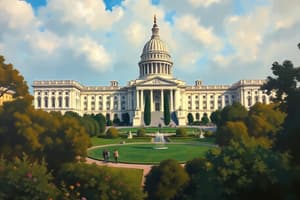Podcast
Questions and Answers
What is the central feature of federalism?
What is the central feature of federalism?
- Total sovereignty of the national government
- Sovereignty resting solely with local governments
- Shared sovereignty between two distinct levels of government (correct)
- Complete independence of subnational entities
In a confederation, where does sovereignty lie?
In a confederation, where does sovereignty lie?
- Solely with the national government
- Solely with the subnational government (correct)
- Equally between national and local governments
- With supranational entities
Which of the following is NOT a characteristic of unitary states?
Which of the following is NOT a characteristic of unitary states?
- Local governments derive power from the national government
- Local governments have sovereignty (correct)
- National government has ultimate authority
- Strong national government
Which statement best describes quasi-federalism?
Which statement best describes quasi-federalism?
What is one key logistical advantage of federalism in large countries?
What is one key logistical advantage of federalism in large countries?
Which of the following is an example of a country that might have quasi-federal characteristics?
Which of the following is an example of a country that might have quasi-federal characteristics?
Which statement is accurate regarding the difference between federalism and unitarism?
Which statement is accurate regarding the difference between federalism and unitarism?
What defines the authority structure in most modern nation-states related to sovereignty?
What defines the authority structure in most modern nation-states related to sovereignty?
What is one potential outcome of having many opposing groups in the central government?
What is one potential outcome of having many opposing groups in the central government?
In which federal system is representation of local entities typically defined irrespective of population?
In which federal system is representation of local entities typically defined irrespective of population?
Which term describes the organization of local entities based on geographical boundaries?
Which term describes the organization of local entities based on geographical boundaries?
What role do courts play in federal systems?
What role do courts play in federal systems?
What characterizes dual federalism?
What characterizes dual federalism?
Which of the following is an example of corporative federalism?
Which of the following is an example of corporative federalism?
What is a significant characteristic of cooperative federalism?
What is a significant characteristic of cooperative federalism?
In what context might small states or provinces become overrepresented?
In what context might small states or provinces become overrepresented?
Which statement best reflects the relationship between heterogeneity and federalism?
Which statement best reflects the relationship between heterogeneity and federalism?
What is a common reason for the establishment of federalism in countries facing external threats?
What is a common reason for the establishment of federalism in countries facing external threats?
Which of the following is NOT a factor that impacts the strength of federalism?
Which of the following is NOT a factor that impacts the strength of federalism?
Which scenario best exemplifies weak federalism?
Which scenario best exemplifies weak federalism?
What is one ideological reason against adopting a federal system?
What is one ideological reason against adopting a federal system?
Which of the following countries is cited as an example of a heterogeneous nation that is federally structured?
Which of the following countries is cited as an example of a heterogeneous nation that is federally structured?
What is the term used for the principle that decisions should be made at the lowest effective level?
What is the term used for the principle that decisions should be made at the lowest effective level?
Which of the following is a consequence of political chaos in a federal system?
Which of the following is a consequence of political chaos in a federal system?
What factor can weaken federalism over time?
What factor can weaken federalism over time?
Which type of federalism is characterized by balanced powers between local and central governments?
Which type of federalism is characterized by balanced powers between local and central governments?
Flashcards
Federalism definition
Federalism definition
A political system with two levels of government, neither subordinate to the other, sharing sovereignty.
Unitary System
Unitary System
A political system where all power stems from the national government. Local governments have power only as granted by the national government.
Confederation System
Confederation System
A political system where subnational governments have sovereignty, meaning that national and even supranational entities have power only if granted to them by the subnational governments.
Federalism scale
Federalism scale
Signup and view all the flashcards
Federalism vs. size
Federalism vs. size
Signup and view all the flashcards
Logistical challenges of large countries
Logistical challenges of large countries
Signup and view all the flashcards
Quasi-federalism
Quasi-federalism
Signup and view all the flashcards
Shared Sovereignty
Shared Sovereignty
Signup and view all the flashcards
Federalism Factors
Federalism Factors
Signup and view all the flashcards
Heterogeneity and Federalism
Heterogeneity and Federalism
Signup and view all the flashcards
Geographic Dispersion and Federalism
Geographic Dispersion and Federalism
Signup and view all the flashcards
External Threat and Federalism
External Threat and Federalism
Signup and view all the flashcards
Historical Autonomy and Federalism
Historical Autonomy and Federalism
Signup and view all the flashcards
Ideological Reasons for Federalism
Ideological Reasons for Federalism
Signup and view all the flashcards
Ideological Reasons Against Federalism
Ideological Reasons Against Federalism
Signup and view all the flashcards
Weak Federalism
Weak Federalism
Signup and view all the flashcards
Strong Federalism
Strong Federalism
Signup and view all the flashcards
Factors impacting Federalism Strength
Factors impacting Federalism Strength
Signup and view all the flashcards
Opposing Groups in Central Government
Opposing Groups in Central Government
Signup and view all the flashcards
Bicameral Federal Parliaments
Bicameral Federal Parliaments
Signup and view all the flashcards
Upper Chamber and Local Representation
Upper Chamber and Local Representation
Signup and view all the flashcards
Role of Courts in Federal Systems
Role of Courts in Federal Systems
Signup and view all the flashcards
Territorial Federalism
Territorial Federalism
Signup and view all the flashcards
Corporative Federalism
Corporative Federalism
Signup and view all the flashcards
Dual Federalism (Separate Spheres)
Dual Federalism (Separate Spheres)
Signup and view all the flashcards
Cooperative Federalism (Shared Power)
Cooperative Federalism (Shared Power)
Signup and view all the flashcards
Study Notes
Federalism Definition
- Federalism is a political system with two levels of government
- Neither level is subordinate to the other
- A key feature of federalism is shared sovereignty
Unitary States
- Sovereignty resides solely with the national government
- Local governments' power is granted by the central government
- Local governments are generally weaker than in federal systems
Confederations
- Sovereignty lies solely with the subnational governments
- National governments have only as much power as the subnational governments allow them
- These systems are uncommon in modern nation-states
Federalism: A Scale
- The difference between federal and unitary systems can be subtle
- Federalism exists on a spectrum
- Almost all countries have some mix of federal and unitary features
- Some unitary systems partially adopt federal policies
Reasons for Federalism
- Large Size and Population: Larger countries have difficulty governing centrally
- Federalism simplifies logistical issues
- Larger countries tend to be federal, smaller countries unitary
- Heterogeneity: Diverse populations are harder to govern uniformly
- Federalism allows different groups to govern according to their needs within a country
- Federal systems generally work best in countries with strong ethnic, cultural, linguistic, or religious diversity
- Geographic Dispersion: Federalism is often a suitable response to geographical dispersion.
- It is often used in geographically diverse, spread out places (e.g., island nations)
- External Threat: Federalism can help smaller entities unite to face common threats.
History of Federalism
- Often results from existing autonomies, not solely from heterogeneity
- Examples include the unification of emirates in the UAE and the USA to combat external threats.
Ideological Reasons for Federalism
- Laboratories of Democracy: Different jurisdictions can experiment with policies
- Subsidiarity: Policies implemented where most appropriate and feasible
- Independent Political Institutions: Local entities can have independent political systems and leaders that check and balance the central government
Ideological Reasons Against Federalism
- Combating Separatist Tendencies: Local governments might use powers to seek independence from the larger entity.
- Incongruent Policies: Divergent policies among local governments can lead to conflicts and potential harm.
- Political Chaos: Complex system of multiple levels of government may lead to gridlock and political disputes.
Features of Federalism
- Strength (weak or strong):
- Weak federalism occurs when the central government heavily dominates local entities
- Strong federalism maintains balanced powers between local and central levels
Factors Affecting the Strength of Federalism
- Tradition of Liberal Democracy: Countries with strong checks and balances usually have more balanced systems of federalism
- Unity in Federal Government: United federal governments are more likely to weaken local autonomy
- Political Oppositions: Multiple opposing groups in the central government may create divisions, leading to stronger federalism
Bicameralism
- Federal parliaments often have two chambers (bicameral)
- Upper chambers often represent local entities
- Representation can follow population, issue or even be based on arbitrary considerations (as in the cases of some historical examples)
- Possible issues exist due to this method of representation
Importance of Federal Courts
- Courts are essential in federal systems
- In disputes between local and federal bodies, courts function to determine the strength of the system, either strengthening or weakening it.
Types of Federalism
- Territorial: Local entities are geographically-based
- Corporative: Local entities are based on group membership
- Dual: Governments occupy separate spheres of power
- Cooperative: Governments have concurrent policy powers, prone to conflict
- Coercive: The federal government dominates the provincial/state governments
- Asymmetric: Different sections of the country have different powers granted
Studying That Suits You
Use AI to generate personalized quizzes and flashcards to suit your learning preferences.




